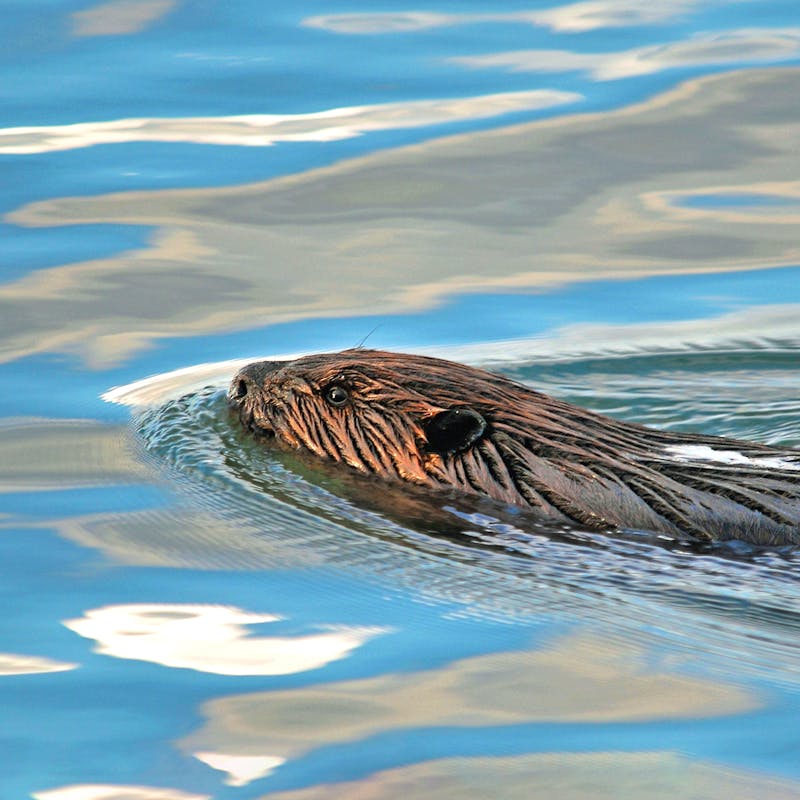After devastating fires ravaged more than 1 million acres of Oregon forest this year, human and natural communities are looking for ways to protect the remaining forests and waterways they depend on. According to Sristi Kamal, Ph.D., senior Oregon representative for Defenders of Wildlife, that much-needed support could come from an unexpected source: beavers.
“Beavers are one of nature’s super engineers, a species that many others depend on, including people,” said Kamal. “They’re one of the least celebrated keystone species but are largely responsible for creating and maintaining healthy aquatic habitat in Oregon and across the country.”
Known for building massive dams and altering or increasing stream flow, these large rodents are the species most credited with changing landscapes in North America, after humans. “Beavers are an important part of healthy wetland and forest ecosystems,” said Aaron Hall, Ph.D., an aquatic ecologist with Defenders of Wildlife who has managed beaver relocation projects and riparian habitat restoration projects throughout the Rocky Mountain region. “We consistently see incredible benefits that come from the presence of beavers, including an increase in available water quantity and quality, more carbon capture zones, wildfire breaks and dynamic wetland complexes.”
Beavers once numbered more than 60 million, inhabiting just about every stream in North America, except in the arid Southwest. But as European colonization spread west and beaver pelts were in high demand, the furbearers were trapped and killed, almost to extinction. While decades of reintroductions and natural expansion increased populations, today beavers maintain only a fraction of their historic numbers and have yet to reinhabit much of their former ranges, including in Oregon. According to Kamal, current hunting and trapping regulations in Oregon provide few protected spaces for the species.
“There are currently just a few waterways where trapping and hunting beavers is banned,” said Kamal. “Instead of welcoming beavers into the abundance of forest habitat throughout Oregon, we have allowed them to be harvested in largely undocumented numbers. The little data we have suggests that beavers are not occupying these spaces where we need them to be.”
By increasing protections for beavers in Oregon, forests and waterways will be more resilient to climate change impacts, says Kamal. “Science has shown a correlation between suitable beaver habitat and carbon capture and store zones,” she said. “By protecting places for beavers, we can strengthen natural buffer zones that already exist in our state, safeguarding both our human and natural communities.”
Many species depend on wetland habitats like those created and maintained by beavers. Freshwater fish find a more plentiful and diverse array of food in beaver ponds, and can use their deep water for shelter during winter. Migratory birds stop by beaver ponds for food and rest along their journey to and from summer breeding grounds. Reptiles and amphibians can spend much of their lives in beaver created wetlands and ponds.
“In Oregon, at-risk species like coho salmon and red-legged frogs would benefit from more beavers on the landscape” said Hall. “Beavers that are protected are able to dramatically alter their environment and enhance habitat for many endangered and imperiled species.”
For over 75 years, Defenders of Wildlife has remained dedicated to protecting all native animals and plants in their natural communities. With a nationwide network of nearly 2.1 million members and supporters, Defenders of Wildlife is a leading advocate for innovative solutions to safeguard our wildlife for generations to come. To learn more, please visit https://defenders.org/newsroom or follow us on X @Defenders.
Media Contact
News

Defenders Receives Advocacy Organization of the Year Award


